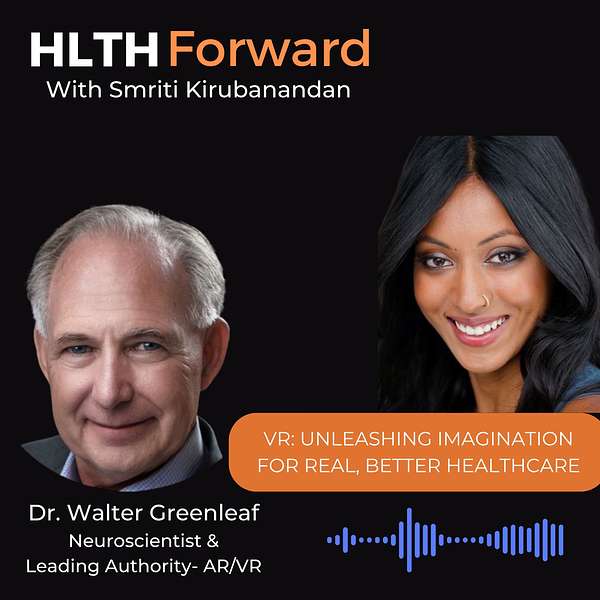
HLTH Forward Podcast
HLTH (Health) Forward is where we hold space for Healthcare leaders, physicians, and key health policymakers to discuss what takes us to move Healthcare Forward. We want to hear challenges, ideas, and out-of-the-box solutions for us to unite our ecosystems further and move the needle towards an innovative, affordable, and all-inclusive healthcare ecosystem.
* Not affiliated with HLTH events
HLTH Forward Podcast
Power of VR: Unleashing Imagination To Experience Real, Better Healthcare , Dr. Walter Greenleaf, Neuroscientist and Medical VR Expert
In this episode, I am in conversation with Neuroscientist and "Godfather of VR" Dr. Walter Greenleaf. He shares his insights on the rapidly evolving roles of virtual reality (VR) and augmented reality (AR) in the healthcare sphere. Greenleaf, whose work explores the intersections of technology and human experience, discusses how immersive technologies like VR are being leveraged for medical training, therapy, and even surgical planning.
The integration of augmented reality (AR) and virtual reality (VR) technologies within the healthcare ecosystem is no longer merely a novelty, but a clinically validated practice area. Among the many promising applications is the use of immersive solutions for mental health support and meditation enablement. For the veteran community grappling with the invisible wounds of post-traumatic stress disorder (PTSD), AR/VR is increasingly being explored as an adjunctive treatment option.
At its core, VR exposure therapy recreates triggering environments and stimuli in a psychologically safe, controlled digital space. This controlled virtual exposure allows patients to gradually confront and process their traumatic memories and associations. Complementing this is the employment of AR for grounding and contextualized therapeutic interventions, superimposing calming visuals and psycho educational guidance onto real-world environments.
Research indicates VR can enhance fear extinction and emotional processing for PTSD patients by integrating cognitive reappraisal with realistic multi-sensory experiences. For veterans, who may struggle to freely discuss their wartime ordeals, immersive environments facilitate perspective-taking and validation of subjective experiences. AR/VR interventions are also being studied for meditation facilitation by transporting users to simulated peaceful settings.
"What's most fascinating," Dr. Greenleaf noted, "is the potential for VR and AR to cultivate empathy and deeper understanding, not just technical proficiency." He drew parallels between the philosophy of mindful observation during meditation and the experiential nature of VR in healthcare contexts. Just as meditation encourages present, non-judgmental awareness, VR can allow medical professionals to step into the subjective experiences of patients and colleagues.
By virtualizing different healthcare perspectives and realities," Greenleaf posited, we can develop a more holistic, empathetic appreciation for the full spectrum of experiences in the healthcare journey.
About
Walter Greenleaf, PhD, is a neuroscientist and medical technology developer. With over thirty years of research and development experience, Walter is considered a leading authority in digital medicine and medical Virtual Reality and Augmented Reality technology.
Walter founded and served as CEO for Greenleaf Medical Systems, a medical product development company; InWorld Solutions, a company specializing in the therapeutic use of virtual worlds for behavioral health care; and Virtually Better, a company that develops virtual environments for the treatment of phobias, anxiety disorders, and
PTSD. Walter was the founding Chief Science Officer for Pear Therapeutics, a pioneering company in SaMD. He served as Senior Vice President of Strategic & Corp. Affairs to MindMaze and is currently advising Interaxon as Chief Science Officer.
Walter’s current research focus is on developing computer-supported clinical products, with a specific emphasis on applying virtual reality and digital health technology to address difficult problems in behavioral and physical medicine, such as Cognitive Aging, Post-traumatic stress, anxiety disorders, depression, traumatic brain injury and
stroke, addictions, and autism spectrum disorder.
His early research was on age-related changes in the
